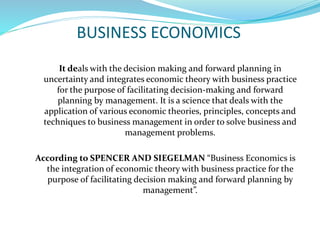The Role of Innovation in Business and Economics In Modern Times
The Role of Innovation in Business and Economics In Modern Times
Blog Article
Comprehending Financial Concepts for Better Company Decision-Making
In the complicated landscape of modern-day business, a detailed understanding of economic principles can substantially improve decision-making processes. By examining factors such as market structures and customer habits, organizations can tailor their approaches to straighten with competitive characteristics and customer demands. Furthermore, insights right into demand elasticity and chance costs offer a framework for maximizing resource appropriation. The application of these financial theories typically exposes unforeseen challenges and chances that can redefine critical strategies. What ramifications do these insights hold for the future of business technique?
The Fundamentals of Economic Theory
Financial theory works as the foundation for comprehending just how people and organizations make selections in the presence of deficiency. At its core, economic concept examines the allocation of restricted sources to please limitless desires. This fundamental principle of deficiency necessitates compromises, compelling decision-makers to examine the benefits and expenses connected with numerous options.
Both primary branches of economic theory are macroeconomics and microeconomics. Microeconomics concentrates on specific agents, such as customers and companies, examining their actions and interactions in certain markets. It highlights ideas like supply and need, price elasticity, and market equilibrium, which are crucial for understanding just how rates are established and just how sources are distributed.
Alternatively, macroeconomics analyzes the economy overall, dealing with broader concerns such as inflation, unemployment, and financial growth. It gives insights right into systemic sensations that influence all economic representatives, leading policymakers in crafting reliable financial techniques.
Inevitably, a strong grounding in financial theory is important for reliable company decision-making. By recognizing the concepts of shortage, trade-offs, and market characteristics, companies can much better browse intricate atmospheres and make notified options that improve their competitive benefit.
Trick Economic Indicators
Key financial indications work as vital devices for examining the wellness and instructions of an economic situation, supplying useful understandings for organization decision-making. These signs are quantitative steps that reflect the financial efficiency and can be categorized right into leading, lagging, and coincident indications.
Leading indicators, such as customer confidence indexes and supply market patterns, anticipate future financial activity, permitting companies to anticipate adjustments in the market. Lagging signs, like joblessness rates and company revenues, supply understandings right into the economic situation's previous performance, aiding services to examine long-term trends. Coincident indicators, such as GDP growth and retail sales, vary all at once with the economic situation, offering a real-time picture of economic problems.
Understanding these signs enables businesses to make educated decisions regarding investments, source appropriation, and tactical preparation. A rise in consumer confidence might prompt business to enhance manufacturing in expectancy of greater demand. Alternatively, climbing unemployment rates could result in a reevaluation of growth strategies. By very closely keeping an eye on these essential economic signs, businesses can navigate uncertainties and position themselves successfully in the ever-changing financial landscape, ultimately enhancing their decision-making procedures and long-lasting success.

Market Frameworks and Dynamics
Comprehending market frameworks and characteristics is critical for companies intending to prosper in affordable atmospheres. Market frameworks, extensively classified right into best competitors, monopolistic competition, oligopoly, and syndicate, significantly influence prices methods, item differentiation, and affordable actions. Each framework presents special challenges and opportunities that can dictate a firm's tactical direction.
Oligopolies, characterized by a few dominant players, lead to interdependent decision-making; companies need to carefully consider competitors' reactions to their activities. Monopolies exist when a solitary firm controls the market, resulting in maximum prices power yet typically bring in regulatory scrutiny.
Comprehending these characteristics allows services to prepare for market trends, adapt approaches, and enhance source allocation. Additionally, acknowledging just how outside variables like innovation and guideline impact these structures can boost calculated planning. By mastering market frameworks and dynamics, companies can make informed decisions, ultimately boosting their click resources affordable setting and driving sustainable growth.
Consumer Actions Insights
Consumer behavior plays a pivotal duty in shaping business approaches and outcomes. Recognizing just how consumers make buying choices, their preferences, and the elements influencing their behavior can substantially boost a firm's capability to satisfy market demands. Key insights into consumer actions can be derived from examining demographics, psychographics, and behavioral patterns.
Market elements such as age, earnings, gender, and education and learning level give a fundamental understanding of target audience. Psychographics delve much deeper, checking out customers' values, lifestyles, and perspectives, which can influence brand name loyalty and item assumption. Behavior insights, such as purchasing regularity and response to promotions, are indispensable for tailoring advertising initiatives.
Additionally, external factors like financial problems, social trends, and technical developments likewise influence consumer selections. As an example, throughout financial slumps, customers might focus article source on crucial products over luxury products, altering demand patterns.
Using Business Economics to Strategy
Insights gained from consumer behavior are critical in developing efficient business strategies. By leveraging more economic principles, businesses can much better understand market dynamics, enhance source allowance, and enhance competitive placing. Examining need elasticity, as an example, enables companies to readjust prices strategies to take full advantage of profits while staying eye-catching to customers.
Additionally, recognizing market division enables organizations to tailor their offerings, ensuring they fulfill the particular needs and choices of diverse customer teams. Business and Economics. This targeted technique enhances customer contentment and fosters brand loyalty

Incorporating game theory right into calculated planning likewise offers insights right into competitive habits, permitting companies to expect competing actions and create counter-strategies effectively.
:max_bytes(150000):strip_icc()/business-economics.asp-FINAL-625037bc97be4d2291ea40d6d291c9f5.png)
Conclusion
In conclusion, an extensive understanding of economic concepts dramatically boosts company decision-making. By checking out market structures, examining customer habits, and examining crucial economic indicators, firms can establish reliable techniques that line up with market needs.
In the complex landscape of contemporary service, a detailed understanding of economic principles can dramatically boost decision-making procedures.Leading signs, such as customer confidence indexes and stock market trends, anticipate future financial task, allowing organizations to prepare for adjustments in the market. By carefully keeping track of these essential economic indications, organizations can browse uncertainties and position themselves effectively in the ever-changing economic landscape, ultimately boosting their decision-making processes and long-lasting success.
By leveraging financial concepts, companies can better recognize market characteristics, enhance source allocation, and enhance competitive positioning.In final thought, a detailed understanding of economic principles significantly improves service decision-making.
Report this page